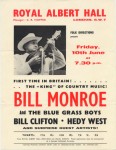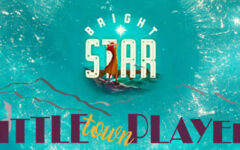 From October 1, 2010 through to the end of September 2011, we will, each day, celebrate the life of Bill Monroe by sharing information about him and those people who are associated with his life and music career. This information will include births and deaths; recording sessions; single, LP and CD release dates; and other interesting tidbits. Richard F. Thompson is responsible for the research and compilation of this information. We invite readers to share any tidbits, photos or memories you would like us to include.
From October 1, 2010 through to the end of September 2011, we will, each day, celebrate the life of Bill Monroe by sharing information about him and those people who are associated with his life and music career. This information will include births and deaths; recording sessions; single, LP and CD release dates; and other interesting tidbits. Richard F. Thompson is responsible for the research and compilation of this information. We invite readers to share any tidbits, photos or memories you would like us to include.
- June 10, 1873 Previously known as the Pigeon Roost, the name of the little community in which Bill Monroe was born was changed to Rosine in honor of Jenny Taylor McHenry, a poet who wrote under the pen name of ‘Rosine’.
- June 10, 1958 Bela Fleck was born in New York City. *
- June 10, 1966 Bill Monroe and the Blue Grass Boys played a concert at the Royal Albert Hall, London. **
- June 10, 1972 Bill Monroe was made an Honorary Page in the House of Representatives “for his outstanding achievement in his chosen field of endeavour, bluegrass music”.
- June 10, 1985 Recording session – During an afternoon session at Sound Stage Studio Bill Monroe recorded Let the Gates Swing Wide. Assisting were Tater Tate [vocal], Wayne Lewis [vocal/guitar], Emory Gordy [bass] and Glen Duncan [vocal/fiddle]. The producer was Emory Gordy, Jr.
- During an evening session on the same day Bill Monroe and Ralph Stanley recorded Can’t You Hear Me Callin’ and Pike County Breakdown. ?Accompanying personnel were the same as during the earlier session and the producer was Emory Gordy, Jr.
- June 10, 1995 The Rosine Association was founded by Aaron J Hutchings. ****
- June 10, 2003 CD released – Bill Monroe – All the Classic Releases 1937-1949 (JSP Records 7712) *****
- June 10, 2006 A Celebration of Bill Monroe’s Music as performed by Mike Compton, Butch Robins and David Grier was held at John Waldron’s Art Center, Bloomington, Indiana.
 * Bela Fleck filled in for banjo player Dana Cupp on a video shoot in Nashville.
* Bela Fleck filled in for banjo player Dana Cupp on a video shoot in Nashville.
Fleck is recognized as one of the most adventurous banjo players, working with New Grass Revival, leading his own band the Flecktones, and playing and recording with other progressive musicians such as Alison Brown, Edgar Meyer and, more recently Abigail Washburn.
His playing embraces many styles of music as well as bluegrass.
Fleck has made a close study of the history of the banjo, tracing its roots back to Africa, producing a documentary film of his work on the subject.
 ** With Bill Monroe were Richard Greene [fiddle], Peter Rowan [guitar], Lamar Grier [banjo] and James Monroe [bass]. Bill Clifton and Hedy West were on the bill also.
** With Bill Monroe were Richard Greene [fiddle], Peter Rowan [guitar], Lamar Grier [banjo] and James Monroe [bass]. Bill Clifton and Hedy West were on the bill also.
*** Let the Gates Swing Wide and Can’t You Hear Me Callin’ were included on the LP Bill Monroe and the Stars of the Bluegrass Hall of Fame (MCA-5625), released on August 19, 1985.
**** The Rosine Association (TRA) was established to educate people about Rosine’s history and the history of bluegrass music, building on the Monroe legacy.
TRA has plans to erect a monument and build a museum on a 20-acre plot known as Everett Park, the same location where Bill Monroe played his 1973 return concert.
It runs the weekly jam session at the Rosine Barn Jamboree.
Hutchings is/was the unit leader of the Louisville-based television station KET2.
***** Bill Monroe – All the Classic Releases 1937-1949, 112 tracks, 4-CD box set
Another great JSP boxed set of archival music at a budget price, All the Classic Releases 1937-1949 collects a great selection of Bill Monroe’s recordings both with his Bluegrass (sic) Boys and with his brother Charlie as the Monroe Brothers. The extensive (though not really informative) liner notes don’t really shed any light as to whether these are all of Monroe’s recorded output from 1937-1949, if these are just complete album releases, singles, and B-sides, or some other permutation, but in listening to the discs it doesn’t really matter. The recordings are all truly classic, even if they’re not necessarily the versions the listening public is most familiar with (Kentucky Waltz and Blue Moon of Kentucky both seem to be slightly different versions than the ones that have been established as the Monroe standards). Lester Flatt, Earl Scruggs, Chubby Wise, Clyde Moody, and other Bluegrass (sic) Boys alumni all make appearances, and nearly all of Monroe’s best-loved songs are represented. While this four-disc set would not be the starting point for bluegrass beginners, die-hard fans of the genre will be quite satisfied with their selection.
Zac Johnson, Rovi
Track listing – My Long Journey Home, What Is Home Without Love, What Would You Give in Exchange, Little Red Shoes, Nine Pound Hammer, On Some Foggy Mountain Top, Drifting Too Far from the Shore, In My Dear Old Southern Home, New River Train, This World Is Not My Home, Watermelon Hanging on the Vine, On the Banks of the Ohio, Do You Call That Religion? God Holds the Future in His Hands, You’ve Got to Walk That Lonesome Valley, Six Months Ain’t Long, Just a Song of Old Kentucky, Don’t Forget Me, I’m Going, Darling Corey, My Savior’s Train, I Am Thinking Tonight of the Old Folks, Dreamed I Searched Heaven for You, Old Cross Road, Forgotten Soldier Boy, We Read of a Place That’s Called Heaven, Will the Circle Be Unbroken, Saints Go Marching In, Roll in My Sweet Baby’s Arms and Where Is My Sailor Boy?
Am I Ready to Go, What Would the Profit Be, Some Glad Day, I Have Found the Way, I Am Going That Way, Kate Cline, Roll on Buddy, Roll On, Weeping Willow Tree, I’ll Live On, Oh, Hide You in the Blood, What Would You Give in Exchange, Pt. 2, On That Gospel Ship, What Would You Give in Exchange, Pt. 3, Let Us Be Lovers Again, All the Good Times Are Passed and Gone, What Would You Give in Exchange, Pt. 4, On My Way to Glory, My Last Moving Day, He Will Set Your Fields on Fire, Sinner You Better Get Ready, Have a Feast Here Tonight, Goodbye Maggie, Rollin’ On, Old Man’s Story, I’ve Still Got Ninety-Nine, Little Joe, Beautiful Life, Pearly Gates, On My Way Back Home and When Our Lord Shall Come Again
Mule Skinner Blues, No Letter in the Mail, Cryin’ Holy Unto the Lord, Six White Horses, Dog House Blues, I Wonder If You Feel the Way I Do, Katy Hill, Tennessee Blues, Shake My Mother’s Hand for Me, Were You There When They Crucified My Lord, Blue Yodel No. 7, The Coupon Song, Orange Blossom Special, Honky Tonk Swing, In the Pines, Back Up and Push, Rocky Road Blues, Kentucky Waltz, True Life Blues, Goodbye Old Pal, Footprints in the Snow, Blue Grass Special, Heavy Traffic Ahead, Blue Moon of Kentucky and Toy Heart
Summertime Is Past and Gone, Mansions for Me, Mother’s Only Sleeping, Blue Yodel No. 4, Will You Be Loving Another Man? How Will I Explain About You? Wicked Path of Sin, I’m Going Back to Old Kentucky, It’s Mighty Dark to Travel, I Hear a Sweet Voice Calling, Little Cabin on the Hill, My Rose of Old Kentucky, Bluegrass Breakdown, Sweetheart You Done Me Wrong, Old Cross Road, That Home Above, Remember the Cross, Little Community Church, Along About Daybreak, When You Are Lonely, Molly and Tenbrooks, Shine Hallelujah, Shine, I’m Travelin’ On and On, Can’t You Hear Me Callin’, Travelin’ This Lonesome Road, Blue Grass Stomp and Girl in the Blue Velvet Band







